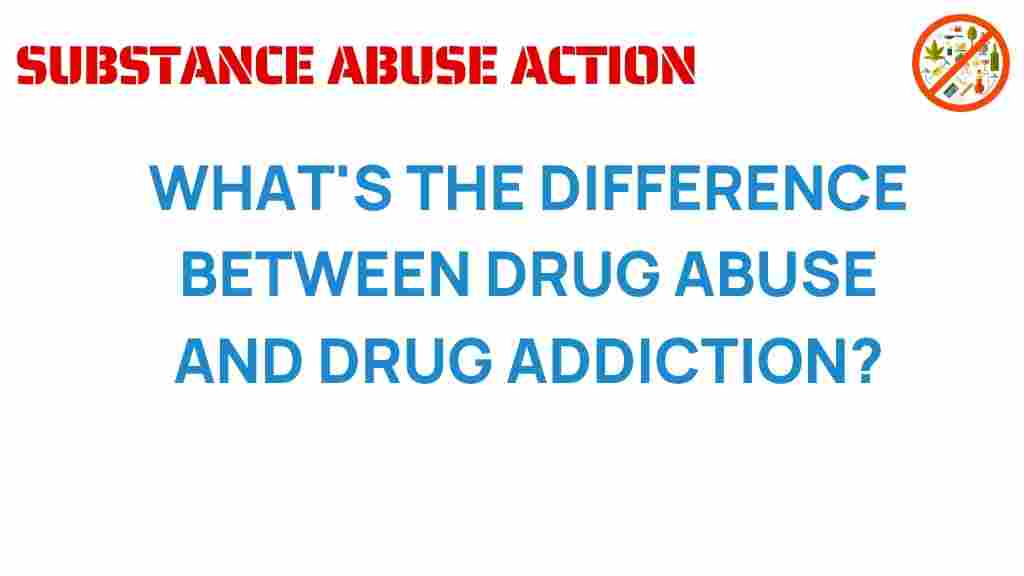Unraveling the Distinction: Drug Abuse vs. Drug Addiction
In the realm of substance use and behavioral health, the terms “drug abuse” and “drug addiction” are often used interchangeably, yet they represent distinct concepts. Understanding the differences between these two conditions is crucial for effective prevention, treatment, and recovery strategies. This article aims to clarify these distinctions, explore their implications for mental health, and provide guidance on seeking help and support.
Understanding Drug Abuse
Drug abuse is characterized by the inappropriate use of substances, leading to harmful consequences, but not necessarily indicating a physical dependence on the drug. It often involves:
- Using drugs in a way that is harmful to oneself or others.
- Engaging in risky behaviors while under the influence.
- Continuing to use a substance despite negative impacts on personal and social life.
Some common signs of drug abuse include:
- Increased tolerance to the substance.
- Neglecting responsibilities at work or home.
- Using substances in dangerous situations, such as driving.
Defining Drug Addiction
Drug addiction, also known as substance use disorder, is a chronic disease that involves compulsive drug-seeking behavior and use, despite harmful consequences. Unlike drug abuse, addiction is often marked by physical dependence and withdrawal symptoms. Key characteristics include:
- Craving for the substance.
- Loss of control over drug use.
- Continued use despite knowing the risks and harms.
Individuals struggling with drug addiction may experience significant changes in their brain structure and function, which can affect their behavior and decision-making processes.
How Drug Abuse Leads to Drug Addiction
Drug abuse is a potential precursor to drug addiction. When individuals engage in drug abuse, they may initially feel that they can control their use. However, as consumption continues, the brain begins to adapt, leading to a cycle of dependence and addiction. Understanding this progression is vital for developing effective strategies for prevention and treatment.
The Impact on Mental Health
Both drug abuse and drug addiction can have profound effects on mental health. Some of the mental health issues associated with these conditions include:
- Depression
- Anxiety disorders
- Post-traumatic stress disorder (PTSD)
- Personality disorders
Individuals may turn to substances as a way to cope with mental health challenges, which can further exacerbate their conditions. This interplay between substance use and mental health highlights the importance of integrated treatment approaches that address both issues simultaneously.
Recognizing the Signs and Symptoms
Identifying the signs of drug abuse and addiction is crucial for early intervention. Here are some common indicators:
- Changes in behavior or personality.
- Withdrawal from family and friends.
- Neglecting personal hygiene and appearance.
- Financial problems due to spending on substances.
- Legal issues related to drug use.
Steps to Recovery
Recovery from drug addiction is a multifaceted process that typically includes several stages:
1. Recognition and Acceptance
The first step towards recovery is recognizing the problem and accepting that help is needed. This may involve self-reflection or feedback from loved ones.
2. Seeking Professional Help
Professional treatment options include:
- Detoxification programs to manage withdrawal symptoms.
- Inpatient or outpatient rehabilitation services.
- Counseling and therapy to address underlying issues.
3. Support Systems
Building a support system is essential. This may involve:
- Joining support groups like Narcotics Anonymous.
- Engaging family and friends in the recovery process.
- Seeking guidance from mental health professionals.
4. Developing Coping Strategies
Learning healthy coping mechanisms can help individuals deal with stress and triggers without resorting to substance use. This might include:
- Mindfulness and meditation practices.
- Physical exercise and healthy nutrition.
- Creative outlets such as art or music.
5. Long-term Maintenance
Recovery is an ongoing process. Continuous engagement in treatment and support systems is vital for maintaining sobriety. Regular check-ins with therapists or support groups can help individuals stay on track.
Troubleshooting Common Challenges in Recovery
Recovery from drug addiction can be fraught with challenges. Here are some common issues and tips on how to navigate them:
1. Cravings and Triggers
Cravings can be intense, especially during the early stages of recovery. To manage cravings:
- Avoid environments or people associated with drug use.
- Develop a list of alternative activities when cravings hit.
- Practice stress-relief techniques regularly.
2. Relapse
Relapse is common and can be a part of the recovery journey. If it occurs:
- Analyze what led to the relapse and learn from it.
- Re-engage with support systems immediately.
- Consider additional professional help if needed.
3. Lack of Support
If you feel unsupported, consider:
- Seeking new support groups or therapy options.
- Communicating openly with family about your needs.
- Connecting with online communities for additional support.
Prevention Strategies
Preventing drug abuse and addiction is essential for promoting overall mental health. Here are some effective prevention strategies:
- Education on the risks associated with substance use.
- Encouraging open conversations about mental health.
- Promoting healthy coping mechanisms in youth.
- Providing access to mental health resources and support.
By focusing on prevention, we can help individuals avoid the potential pitfalls of drug abuse before they escalate into addiction.
Conclusion
Understanding the distinction between drug abuse and drug addiction is vital for effective intervention and support. Both conditions can significantly impact mental health and overall well-being, but with the right approach to treatment and recovery, individuals can reclaim their lives. Whether you or someone you know is struggling with substance use, remember that help is available. Reach out to professionals, support groups, or loved ones to initiate the journey toward recovery.
For more information on treatment options and resources, visit Substance Abuse and Mental Health Services Administration (SAMHSA). You can also learn more about support strategies at Narcotics Anonymous.
This article is in the category Addiction and created by SubstanceAbuseAction Team
